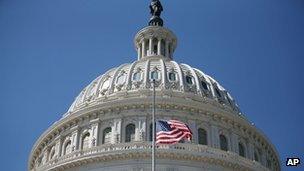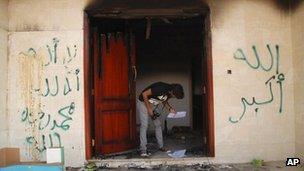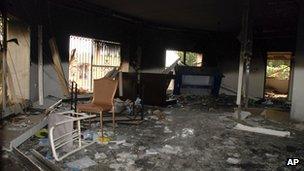Did Ansar al-Sharia carry out Libya attack?
- Published

At the US Capitol in Washington, the flag flew at half mast in memory of the American dead
A little-known Islamist group has been blamed for the attack on the US consulate in the city of Benghazi.
The attack led to the death of the US ambassador to Libya, J Christopher Stevens, and three other US officials.
Libya's deputy ambassador to London, Ahmad Jibril, named Ansar al-Sharia as the perpetrators.
The group apparently took advantage of a demonstration against a trailer for a controversial American film, Innocence of Muslims.
Although the trailer has been around for a year, an Arabic version was recently uploaded to the internet.
According to accounts, a group of people were demonstrating outside the US consulate on Tuesday when they were joined by members of an Islamist group in pickup trucks.
The number of fighters was reported to be anything from as many as 80 to as few as 20.
"The Libyan government provides security to all diplomatic missions in the country but I don't think they were prepared for an attack like this," said Mr Jibril.
"The Libyan security services did not have the ability to counter these people."
'Lacking experience'
A Libyan reporter in Benghazi, Osama al-Fitri, told the BBC World Service he had seen militiamen armed with AK47 assault rifles and 14.5mm anti-aircraft machine guns.
Other eyewitnesses spoke of seeing rocket-propelled grenades.

Messages were daubed on the walls of the consulate in Benghazi
The attackers were keen to hide their identities. Al-Fitri said one threatened to shoot him unless he turned off his camera.
The attackers raised the black flag - a Jihadi symbol - over the US consulate.
According to Libya expert, George Joffe, Ansar al-Sharia is one of several Islamist groups active in Cyrenaica, or eastern Libya.
Although its members are most probably Libyan, and the group emerged from the armed Islamist opposition to Col Muammar Gaddafi, Ansar al-Sharia also has links to foreign groups. Last year, without success, it attempted to set up an Islamic state in the eastern part of the country.
They are a relatively new group to Libya and, seemingly, lack battlefield experience.
"They were not known [in] Libya before the revolution. We had the Libyan Islamic Fighting Group, we had the Muslim Brotherhood, we had Salafists but this group we did not hear about until recently, until after the revolution started," said Mr Jibril.
Ansar al-Sharia is blamed for crimes committed in eastern Libya. "The group has carried out several terrorist attacks within the last few weeks and also the killing of some Libyan officials, especially in Benghazi," said Mr Jibril.
However, with the current confused situation in eastern Libya, pinning the blame on any single group will be difficult.
Precision attack
Although the attack on the US consulate has been linked to the US film, Libya experts have also suggested a different reason.

Rooms of the consulate were completely gutted in the attack
"This was a precision attack," said Mr Joffe. "One that would have required a degree of planning. It may well have been inspired by the call by al-Qaeda's Ayman al-Zawahiri to avenge the killing of Abu Yahya al-Libi."
Al-Libi was a Libyan-born al-Qaeda commander killed in June by a US drone strike in the North Waziristan-Afghan borderlands.
It is difficult to know exactly who carried out the consulate attack but there are plenty of people in eastern Libya with the will, equipment and battlefield experience to carry out an operation of this kind.
Ahmad Jibril also suggests that the Islamist groups now operating in Libya enjoy the protection of elements of the state.
"Libya's Supreme Security Committee has some elements from these groups. So sometimes there is a conflict inside the institutions, inside the Security Committee in Libya, when these groups have the upper hand in some cities. Unfortunately, I think Benghazi is one of those cities."
The success of this attack shows there is a serious security vacuum in Libya.
"That is a fact, not just speculation," says Mr Jibril. "This is the tip of the iceberg of the very many serious challenges that the Libyan government is facing at the moment."
Mr Jibril says it is vital for the Libyan government to re-establish control of security in eastern Libya by facing up to groups such as Ansar al-Sharia.
However, it cannot be taken for granted that Libya can defeat them. He suggest international assistance may be necessary.
And he has a warning for those who would avoid the fight.
"If the government does not take the necessary steps to encounter these challenges, then I think we are heading towards disaster."
- Published13 September 2012
- Published12 September 2012
- Published12 September 2012